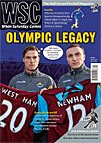The Archive
Articles from When Saturday Comes. All 27 years of WSC are in the process of being added. This may take a while.
 The last time City played United in an FA Cup semi-final was 1926. Gary James explains how some things have hardly changed
The last time City played United in an FA Cup semi-final was 1926. Gary James explains how some things have hardly changed
A match being promoted as the greatest ever is not a modern phenomenon. Eighty-five years ago one newspaper previewed the first all-Manchester FA Cup semi-final as “the greatest of the Cup ties that have ever been played”. Another claimed it was “an historic event – one that may never occur again”. That was close – it has taken 85 years for the feat to be repeated.
Read more…
Saturday, May 21st, 2011 - The Archive
 These Yorkshire rivals may yet head in different directions out of the Championship. But in a tense occasion on a sunny day the confident pre-match favourites fall to a chastening defeat. David Stubbs reveals all
These Yorkshire rivals may yet head in different directions out of the Championship. But in a tense occasion on a sunny day the confident pre-match favourites fall to a chastening defeat. David Stubbs reveals all
Bramall Lane’s highest ever attendance was the 68,287 who witnessed an FA Cup tie against Leeds in 1936. The rivalry between the two clubs is intense but fitful, as both have bobbed up and down between divisions over the years. In the early 1970s, when Sheffield United climbed back into Division One under manager John Harris, I recall as a young lad in Leeds watching highlights of the home and away Sheffield fixtures on Yorkshire TV the following Sunday afternoon.
Read more…
Saturday, May 21st, 2011 - The Archive
 Dave Hannigan looks at how Ireland are hoping to attract young footballers with a US education but an old country sentiment
Dave Hannigan looks at how Ireland are hoping to attract young footballers with a US education but an old country sentiment
In a little-noticed cameo during the February international break, Derby County striker Conor Doyle made his debut for Ireland Under-21s in a friendly against Cyprus. Born and raised in Texas to a father from Dublin, the 19-year-old’s appearance came just three months after Giovanni Trapattoni expressed interest in establishing a scouting network to find new talent for Ireland in the United States. Indeed, Trapattoni went as far as asking for a full list of Major League Soccer players with Irish-sounding
surnames.
Read more…
Thursday, April 21st, 2011 - The Archive
 Paul Giess worries that due to administrative failure vast amounts of football merchandise will shortly be out of date
Paul Giess worries that due to administrative failure vast amounts of football merchandise will shortly be out of date
Unlike many competitions around the world South Africa’s Premier Soccer League welcomed February’s midweek FIFA international schedule with open arms. March sees a crucial Africa Cup of Nations qualifier against current holders Egypt, who are regarded as the best side on the continent, despite not making it to last year’s World Cup. At the request of Bafana Bafana coach Pitso Mosimane, a whole raft of scheduled games was moved to accommodate a friendly and give him time to work with his team. The response from the South Africa Football Association (SAFA) made a mockery of the praise that the country earned with its organisation of the 2010 World Cup.
Read more…
Thursday, April 21st, 2011 - The Archive
 The Brazilian tradition of exporting talented footballers to the rest of the world may be changing. Robert Shaw reports
The Brazilian tradition of exporting talented footballers to the rest of the world may be changing. Robert Shaw reports
The new season in Brazil kicked off in January with an unusual sight: four of the country’s biggest stars over the last two decades (Ronaldo, Rivaldo, Roberto Carlos and Ronaldinho) were playing for local clubs. Admittedly this curious spectacle did not last long. Corinthians’ cataclysmic exit from the Copa Libertadores saw Roberto Carlos fleeing to another big pay day in Russian football and
Ronaldo bringing forward his retirement.
Read more…
Thursday, April 21st, 2011 - The Archive
 The last time City played United in an FA Cup semi-final was 1926. Gary James explains how some things have hardly changed
The last time City played United in an FA Cup semi-final was 1926. Gary James explains how some things have hardly changed